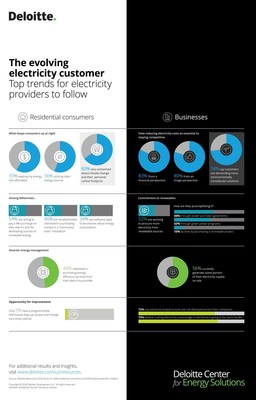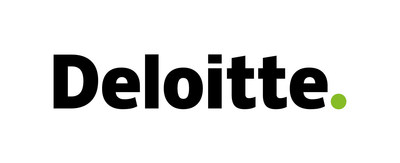|
Deloitte Survey: Millennials Increasingly Driving Force Behind Electric Utility Transformation
HOUSTON, June 21, 2016 /PRNewswire/ -- A motivational trifecta of environmental sensitivity, practicality and affordability is driving residential consumers and businesses to find ways to utilize more renewables and expand energy management practices, according to Deloitte's "Resources 2016 Study - Energy Management: Navigating the Headwinds." The report highlights the increasing influence of millennials aged 21-34, the largest and most dominant consumer group, as a dynamic force behind the shift to cleaner sources of energy – inspired by the desire to reduce their personal carbon footprints.
 "The strong desire of residential consumers for clean-energy options, coupled with the increasing cost-effectiveness of solar and wind, are driving growing opportunities for utilities and businesses to explore ways to expand deployment of renewables," said Marlene Motyka, U.S. alternative energy leader and principal, Deloitte Transactions and Business Analytics LLP. "This trend is really being led by the millennial generation, whose wants and needs are not only relevant, but increasingly an influential factor in the transformation of electricity providers."
The sixth annual "Resources 2016 Study" shows that we have passed a tipping point: The concept of reducing energy consumption has become engrained, despite record-low energy prices that have reduced the need to cut costs. The report captured many other compelling residential consumer and business perspectives about energy management attitudes, actions and motivations. Among the findings are:
Residential consumers are concerned about the environment and climate change
- Seventy percent of residential consumers say they are very concerned about the earth running out of important resources.
- Seventy-one percent believe climate change is caused by human actions, and 65 percent now say they are "very concerned" about climate change and their personal carbon footprints, climbing 4 percentage points from 2015.
- While 59 percent of residential consumers identified "keeping my energy bills affordable" as the most important energy issue, 56 percent said "utilizing clean energy sources" was almost as important.
Millennials leading the charge toward a clean energy future
Millennials are more concerned about shifting to cleaner sources of energy, are more willing to pay for this shift through a surcharge in their electricity bills, and are also more interested in incentives for saving electricity and purchasing related technologies.
- Eighty-six percent of millennials believe the government should be active in setting a vision and path for driving U.S. energy strategy, compared with 80 percent of Gen X (aged 35-48), 76 percent of baby boomers (aged 49-67) and 63 percent of matures (aged 68+).
- Although there is a growing willingness amongst all consumers to pay a surcharge on their electric bills for developing sources of renewable energy – the highest support was among millennials and lowest favorability was among matures.
- Millennials also are leading the way in using energy apps, with 34 percent indicating use of software apps to be smarter about energy consumption, compared to 26 percent of the general population.
- Fifty-two percent of millennials are receptive to solar, with 60 percent noting that solar does not contribute to climate change.
- Forty-six percent of millennials were extremely interested in purchasing a share in a utility-scale solar installation that would allow them to meet some or all of their energy needs.
Although desire is strong, energy-management follow-through has been lackluster
Despite an ongoing commitment to energy management, consumers still have not acted on their intentions to deploy tactics that require greater effort and investment, such as rooftop solar, smart thermostas, and energy efficient doors and windows. Beyond the cost barrier, consumers fear biting off more than they can chew in terms of taking energy-management efforts to the next level.
- Most consumers fail to see the merits of "smart" technologies: Only 5 percent have a programmable thermostat with smart phone accessibility, and just 2 percent have a home automation system that can be accessed by a mobile device.
- Just over 1 in 10 (12 percent) with basic thermostats plan to upgrade to one that can be accessed or changed via a mobile device or to purchase a home automation system in the next year.
- Sixty percent of those who have basic thermostats indicated they don't plan to upgrade because their current device does its job, and 29 percent say it's too expensive.
- Despite the strong interest in rooftop solar, there are still barriers. For the third consecutive year, perceptions of being expensive (42 percent) and fears of the panels not working as promised (23 percent) remained the main barriers to residential consumer interest in solar.
Interest in sourcing additional services from electricity providers is increasing
Consumer interest in sourcing at least one additional service from their electricity providers is growing across generations, and this growing trust in electricity providers could open the door for utilities to evolve business models to offer other services.
- Seventy-five percent of residential consumers would consider sourcing another service from electricity providers.
- About half (48 percent) of residential consumers are interested in purchasing energy-efficiency services from their electricity providers; the same percentage would be interested in purchasing Internet services as well from their electricity providers.
- Other desired services were cable services (38 percent), telephone services (31 percent), home security systems (25 percent) and home automation systems (18 percent).
- Only 25 percent of residential consumers would not consider sourcing another service from their electricity providers, with 48 percent attributing "electricity companies shouldn't be in the business of providing these services" as a reason, down from 55 percent in 2015.
"We see similar trends on the business side as we do with residential consumers, with customers leading the way for companies to be resourceful and demanding greater environmental stewardship," said John McCue, vice chairman and U.S. energy and resources leader, Deloitte LLP. "Containing electricity consumption remains an essential aspect of corporate strategy and a competitive advantage from both a cost-reduction and image standpoint. Utilizing renewables is increasingly a part of this success equation."
The rise of on-site generation for businesses
Fifty-six percent of businesses generate some portion of their electricity supply on-site, and more than half of businesses (52 percent) say they are working to procure more electricity from renewable sources, driven by the dual advantage of cost reduction and being green.
- Eighty percent of businesses view reducing electricity costs as essential to staying competitive from an image perspective.
- Seventy-four percent of businesses say customers are demanding they offer more environmentally considerate solutions, up from 66 percent in 2015.
- Of those businesses with on-site generation, 43 percent of total energy supply is sourced from electricity providers with the remainder split between on-site cogeneration (15 percent), on-site renewable generation (16 percent), fuel cells (16 percent) and other sources (9 percent).
Businesses procuring more electricity from renewable sources as a "two-fer" advantage
- More than half (52 percent) of businesses are working to obtain more electricity from renewable sources, driven by the dual advantage of cost reduction and being green.
- Fifty-six percent of those procuring electricity from renewables are doing it through power purchase agreements (PPAs), 52 percent through green power programs, and 12 percent by directly purchasing a renewable project.
- This is also driving record-breaking PPA activity, with corporations having signed PPAs for large-scale, offsite renewables covering 3.44 GW of power in 2015, up from 1.2 GW for all of 2014.
Businesses: lack of effective tools, employee buy-in, limiting success
Although businesses already have invested a significant proportion of their total capital budgets in pursuit of resource-management goals, multiple challenges, including the lack of data analytic tools, are cited as significant obstacles to achieving the next level of success.
- Seventy percent indicated that technology available today is inadequate in helping manage energy consumption, up 13 percentage points from 2015.
- Seventy-six percent encountered unexpected "hiccups" in rolling out new energy-management practices to their companies – representing a 10-point increase from 2015.
- Sixty-nine percent have difficulty gaining acceptance and participation from employees regarding energy management – a steep increase from 56 percent in 2014.
- As in 2014 and 2015, businesses cited length of payback period as the primary barrier to achieving their resource management goals.
Connect with us on Twitter at: @Deloitte4Energy, @MarleneMMotyka and @JMcCue624.
About the Deloitte Center for Energy Solutions
The Deloitte Center for Energy Solutions (the "Center") provides a forum for innovation, thought leadership, groundbreaking research, and industry collaboration to help companies solve the most complex energy challenges. Through the Center, Deloitte's energy and resources group leads the debate on critical topics on the minds of executives — from the impact of legislative and regulatory policy, to operational efficiency, to sustainable and profitable growth. With locations in Houston and Washington, DC, the Center offers interaction through seminars, roundtables, and other forms of engagement where established and growing companies can come together to learn, discuss and debate. www.deloitte.com/us/energysolutions.
About Deloitte
Deloitte provides industry-leading audit, consulting, tax and advisory services to many of the world's most admired brands, including 80 percent of the Fortune 500. Our people work across more than 20 industry sectors to deliver measurable and lasting results that help reinforce public trust in our capital markets, inspire clients to make their most challenging business decisions with confidence, and help lead the way toward a stronger economy and a healthy society.
As used in this document, "Deloitte" means Deloitte LLP and its subsidiaries. Please see www.deloitte.com/us/about for a detailed description of the legal structure of Deloitte LLP and its subsidiaries. Certain services may not be available to attest clients under the rules and regulations of public accounting.
Photo - http://photos.prnewswire.com/prnh/20160620/381529-INFO
Logo - http://photos.prnewswire.com/prnh/20160614/379251LOGO
To view the original version on PR Newswire, visit:http://www.prnewswire.com/news-releases/deloitte-survey-millennials-increasingly-driving-force-behind-electric-utility-transformation-300287531.html
SOURCE Deloitte

[ Back To TMCnet.com's Homepage ]
|



